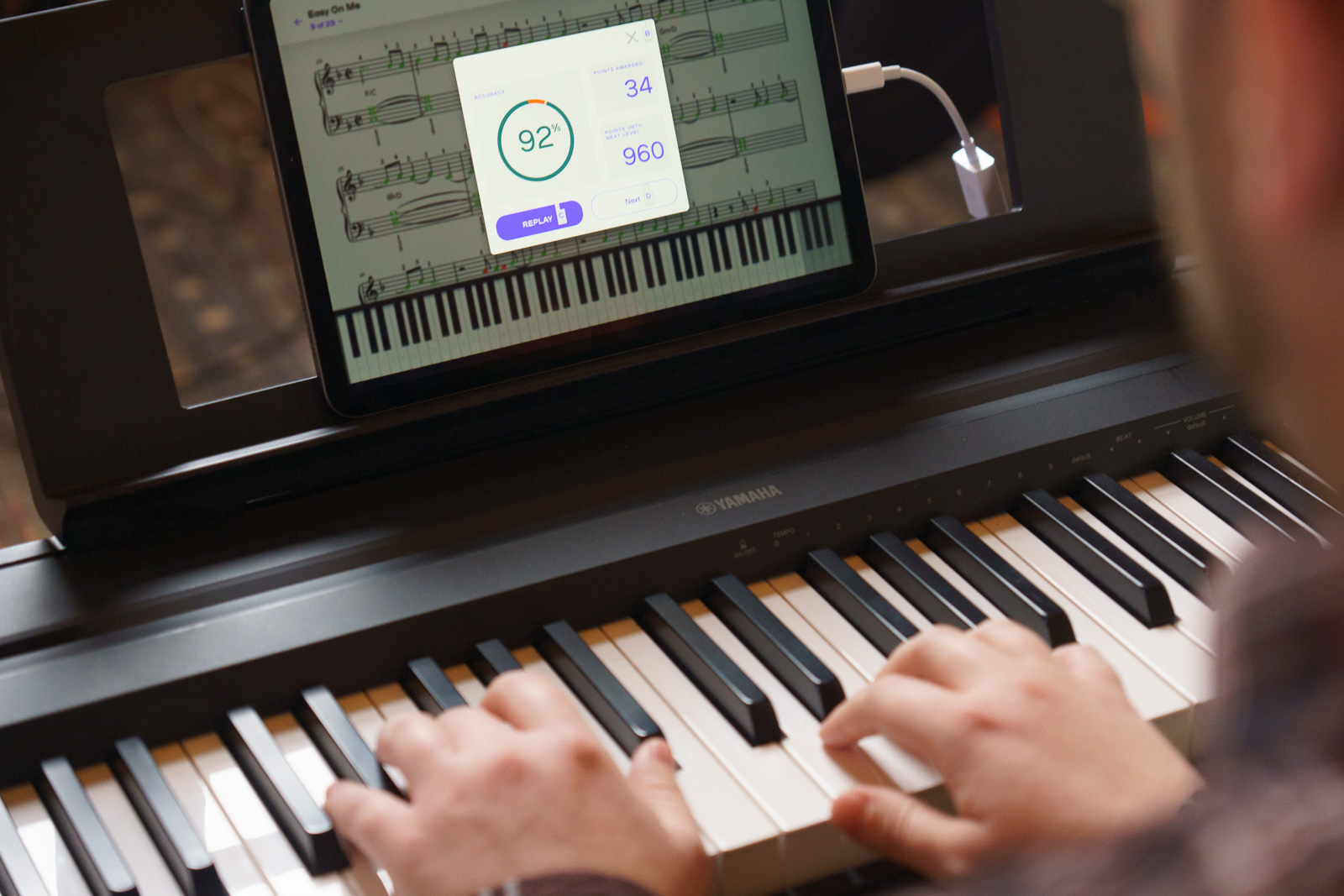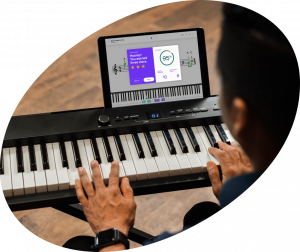Is piano hard to learn?
When it comes to beginning piano, you just need two things: first, a love of music, and second, the desire to learn. You already know that the piano is a beautiful instrument: why not make it a part of your life? Even if you’re just getting started, there’s a lot of amazing music you can play. From Day 1, every day of your piano journey can be a pleasure.
You may be wondering: “Is there a right age to start piano lessons? Is learning piano as an adult harder?” No, of course not. It’s never too late to start lessons (nor is it ever too early). Learning to play piano is like riding a bicycle: no one is born with the knowledge of how to do it. Instead, one needs to learn by trying and practicing. Right from the start, you’ll build a deeper understanding of the songs and sounds you love. The joy of music starts the very first time you sit down at the piano, and that joy only grows with experience. Of course, there are amazing musicians who have been practicing piano for their whole life. We should be inspired by these people, not intimidated by them. Remember that even they were beginners once! A journey of a million notes starts with a single step.
If you’ve read this far, then I believe you’re ready to take that step. So, what is the first step you should take when beginning piano? For a lot of people, simply knowing where to get started is the hard part. There are so many options that it can be overwhelming. In this blog post, I’m going to walk you through some of those options, and I want to convince you that all of them are good in certain ways. My goal is just to share some basic information, to give you the confidence to choose the piano-learning path that feels best for you.
Where to begin learning piano
There are many options for beginning piano. One good option is to just dive right in. Some people feel comfortable picking a song they like, finding an online video tutorial, and giving it a shot. If the song is well-known, chances are that someone has posted an easy piano tutorial of it online. A great approach is looking for must-learn piano songs for beginners and learning them hands-on. This is approach is incredibly effective if you have a lot of motivation and some self-discipline.
I think there are a lot of benefits to beginning piano this way, and I recommend trying it out to see if it works for you. It’s simple, direct, flexible, and free. At the very least, you’ll get a feel for the challenges of learning a piece of music on piano: pattern recognition, ear training, concentration, coordination, and more.
You may find that free video tutorials are completely musically fulfilling. On the other hand, you may find learning this way too challenging. There’s no question that the learning curve when beginning piano can be steep. You may feel overwhelmed by the thousands of videos available. You may want to understand the fundamentals of music better. You may want more direct feedback and clearer guidance, or to be part of a larger musical community, and not just learning on your own. If that’s the case, read on.
Online versus in-person piano lessons
That brings us to two other options: online lessons through music education software, and in-person piano lessons.
Of the many different methods of learning piano, in-person piano lessons may give you the structure you need to succeed. If video tutorials are too confusing or frustrating, then maybe you prefer to work with an expert who can answer whatever specific questions you have about practice. Or, if the tutorials feel too impersonal, then maybe you want face-to-face contact. Maybe you just like a regular meeting with someone to remind you to keep practicing. These are all valid reasons to give in-person lessons a try.
Even within the category of lessons, there are different options. You can take lessons in person (the old-fashioned way), or online, through music education software. Yet again, each type of lesson has its own pros and cons. I outline some of these below.
Learning piano in person
In-person lessons will give you some human contact and support. You’ll interact regularly with an experienced musician. Finding a teacher can be challenging, but to get the ball rolling, start with these three easy steps:
- Ask friends who play instruments
- Look into music schools in your area
- Google piano teachers in your area
Of the many options for learning the piano, in-person lessons are the most challenging logistically. You’ll need to think through the following questions:
- Do you prefer for the teacher to come to your home, or do you prefer to meet the teacher somewhere else (at their home or music studio)? The pros and cons here include comfort level, equipment quality, and commuting time and costs.
- Do you want to be part of a music school (for example, a community music center or conservatory), or are private lessons okay? You may find value connecting with a broader music community, or this may not matter to you. Price and level of commitment may also come into play here.
Let’s say you’ve worked all that out and you’ve found a teacher or two that might work. Now it’s time for some important interpersonal and musical questions:
Do you actually like this teacher as a person? Do you feel comfortable around them? Are they kind and supportive? A good piano teacher is one who is understanding and caring. Unfortunately not all teachers are like that, and the really bad ones can even be disrespectful and uncaring. Fortunately, there are plenty of teachers who can motivate you through positivity, not negativity!
Does the teacher play the sort of music you want to play? Do you like the way they play? You need to find someone who knows the “piano language” that speaks to you. You wouldn’t take a French class expecting to learn Spanish, and you shouldn’t take lessons from a classical pianist expecting to play jazz (or vice versa).
Suppose, after all this, you’re able to find a teacher you like. Just as in any other relationship, it may be that things start out great but then go sour. Maybe you feel like you’re not getting appropriate feedback, or that your teacher isn’t being supportive enough of your goals, or attentive enough to the sort of music you want to play. If you feel like your musical needs aren’t being met, it is always acceptable to express how you feel (in words, of course). If your teacher can’t make changes to improve your experience, then it’s completely fine to cancel the lessons and look for a new teacher.
Finding a piano teacher can be challenging, but for many beginners it’s a worthwhile one. The support of a one-on-one teacher can be priceless. For others, the actual price tag will be too high. Music lessons can be expensive. Even if you’re paying just $30 a week per lesson, this adds up to over $1500 after a year!

Learning online
That brings us to a third option: online learning, using piano software. This option is a good compromise in terms of structure, community, and price. Here are some features that make piano software attractive:
- With a software program, you get all the advantages of online video tutorials. You can find a large selection of the music you love, taught in detail by engaging music instructors.
- The software offers more than that, however. It integrates the videos into a holistic music education program. When you use the software, you get access to a guided music curriculum and lessons that are broken up into clear, comfortable steps. This is similar to what you’d get in a music classroom or in private lessons, for a fraction of the price.
- There’s another major advantage of software: it provides a game-like practice environment with instant feedback. This makes it easy to see what notes you’re playing correctly or incorrectly. The feedback speeds up the process of connecting what you see with what you hear.
- Piano software tends to use gaming elements such as scores and badges to make practicing more fun. It also uses personal data to evaluate progress and make content recommendations. Although you’re not meeting face-to-face with someone for lessons, a personalized music education is still possible.
- Last but not least, any piece of piano software has a devoted community of users. They take part in community challenges, and inspire each other to improve by sharing their experiences online.
In short: if you want to learn to play the piano, online piano software may not always be as cheap as online video tutorials, but it’s a lot less expensive than private lessons, costing $5 a week on average. It’s a great value for what you get. While it’s not the most structured way to learn, it’s definitely not structureless. And though you won’t be meeting people in person to learn, you can still be a part of a community if you want to be.
If piano-learning software sounds appealing to you, then you may want to check out Playground Sessions. It was designed with all these features in mind.
Plan your piano journey accordingly
In this chapter, we discussed a few different piano learning options: free video tutorials, in-person lessons, and online piano software. For each option, I weighed some pros and cons. Here’s a table that sums everything up for you:
| In-person lessons | Free online video tutorials | Online piano software | |
|---|---|---|---|
| Price | Expensive | Free | Affordable |
| Ease of setup | Complicated | Easy | Easy |
| Convenience | Inconvenient | Very convenient | Very convenient |
| Education structure | Strict structure | Unstructured | Flexible structure |
| Time commitment | Highest commitment | Flexible | Flexible |
| Social support | Teacher feedback | None | Feedback from community, social networks, and personalized analytics |
Some final words of wisdom:
Please keep in mind that these learning options are not mutually exclusive. You’re allowed to mix and match, to find the learning recipe that works best for you. Everyone is different, and experimentation is healthy. There’s no right way to learn the piano.
I started taking piano lessons when I was very young. At first I had an unpleasant teacher. For a few years I was miserable enough that even though I loved music, I would have quit the piano. Fortunately I didn’t give up. Instead, I switched teachers and I found a wonderful supportive mentor. Now, I do not take lessons at all. Instead I watch tutorials and use piano software for fun. My own musical journey has convinced me that there is no right or wrong way to learn music, as long as we are challenging ourselves to listen better and to play beautifully.
Any first step, no matter how small, is a step forward. Everything counts. Don’t feel like you need to commit a lot of time, energy, or money to start learning the piano. Having more music in your life should decrease your stress, not increase it!
Last but not least, I hope you feel empowered to find whatever other information you need to make your decision. It’s easy to find online reviews of various piano learning apps. Don’t be afraid to ask a lot of questions: any question you have is valid.
I hope this gives you an honest and helpful guide to making some next steps in your piano journey. Good luck!
Next Chapter: Keyboard vs. piano >
